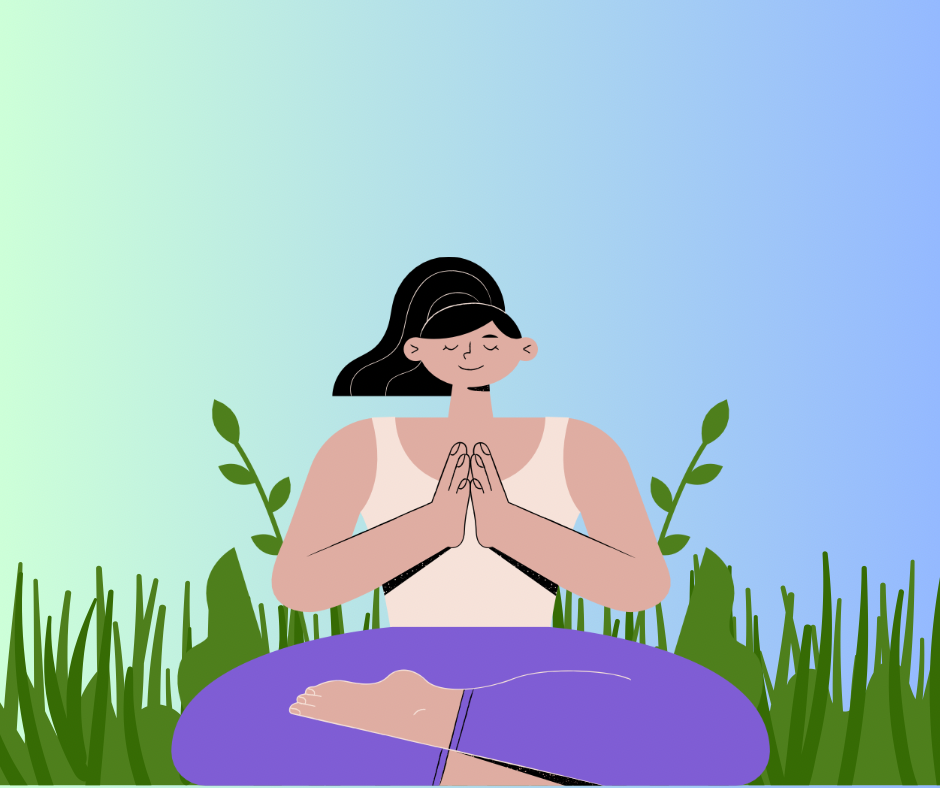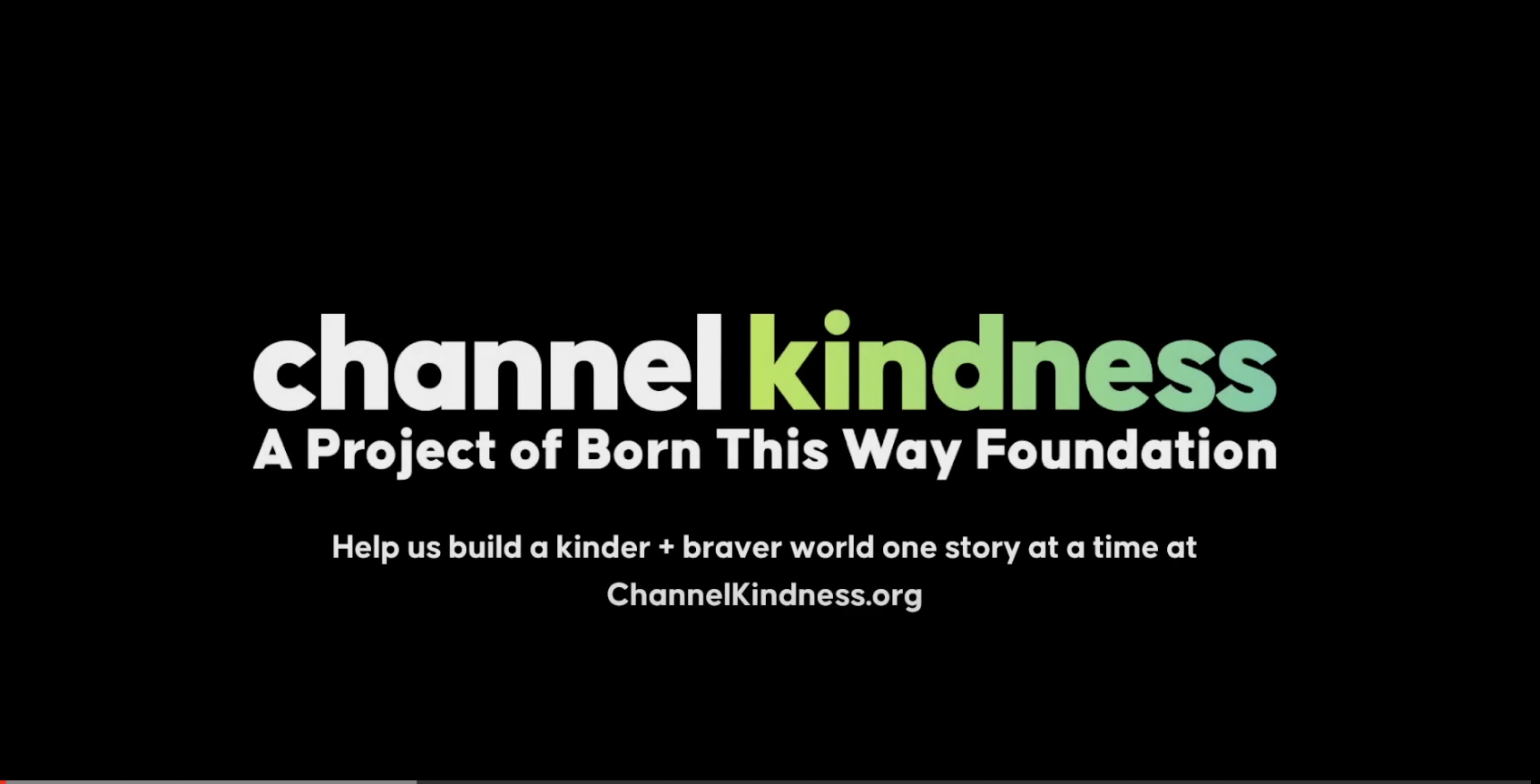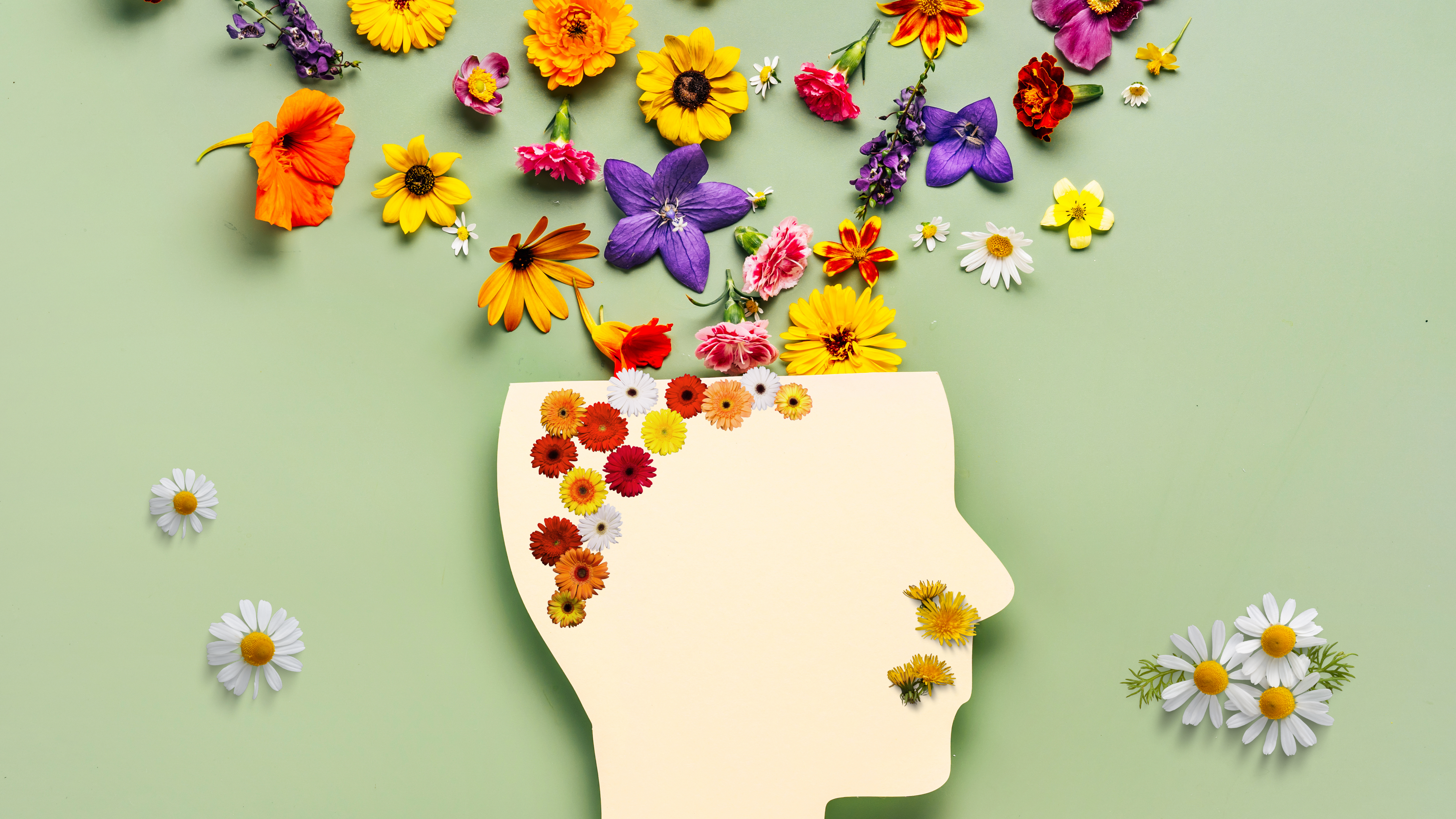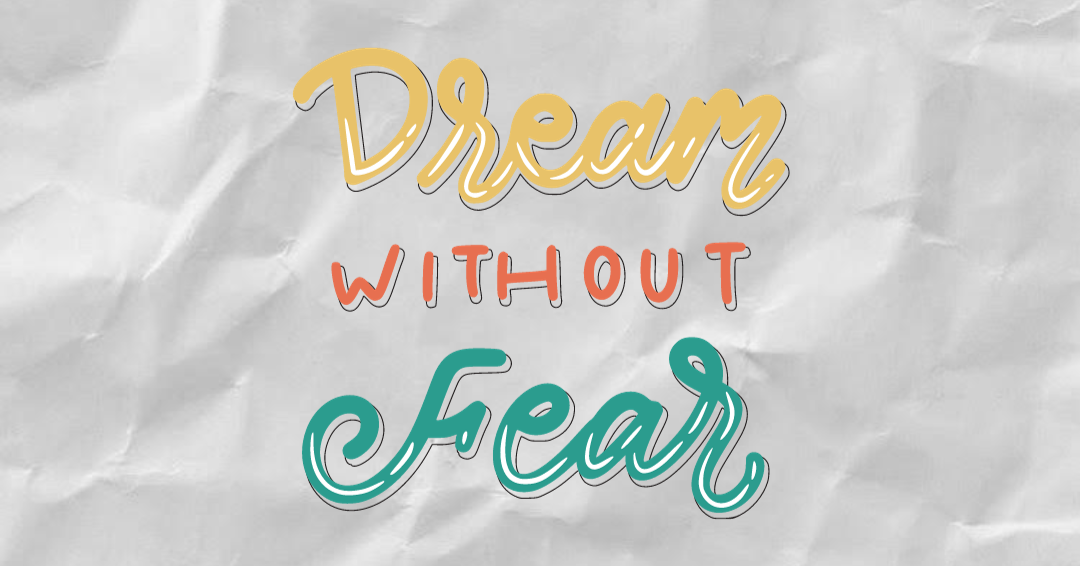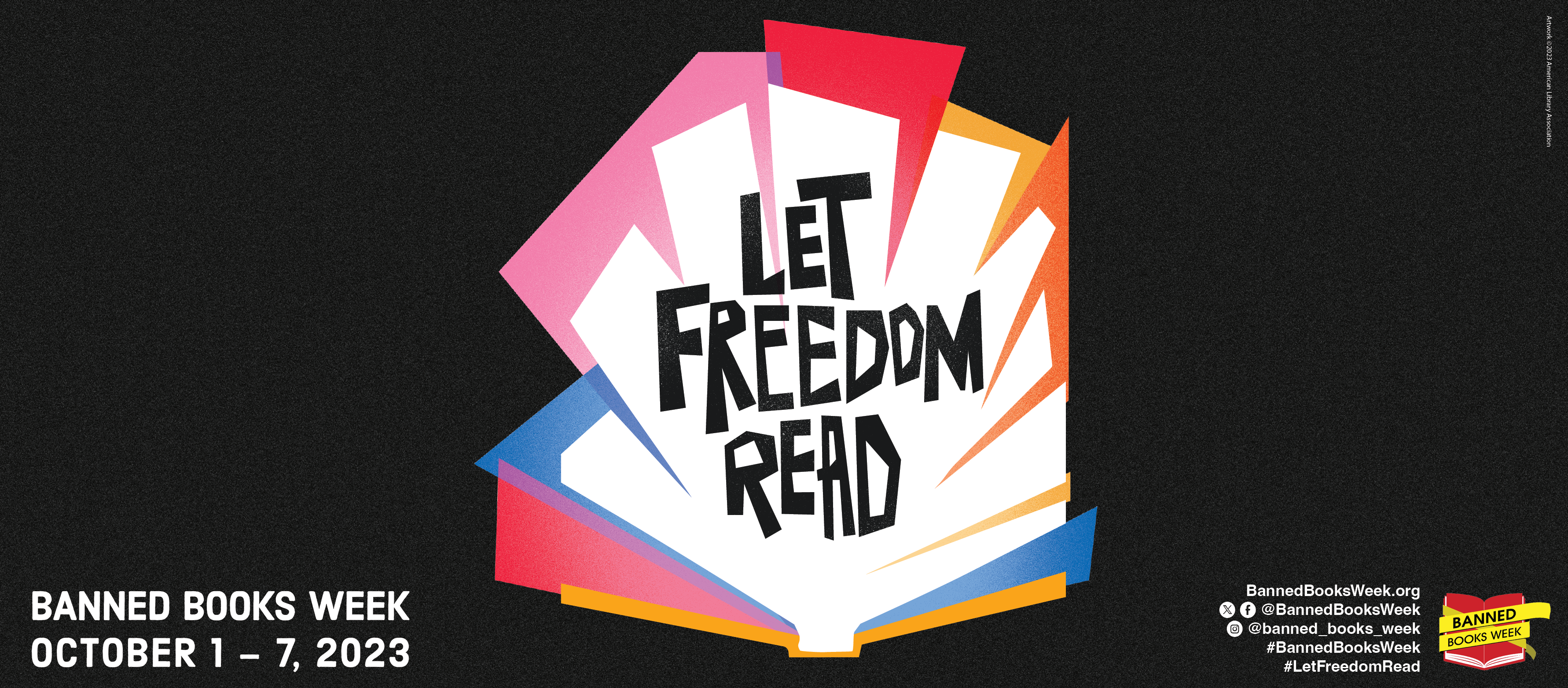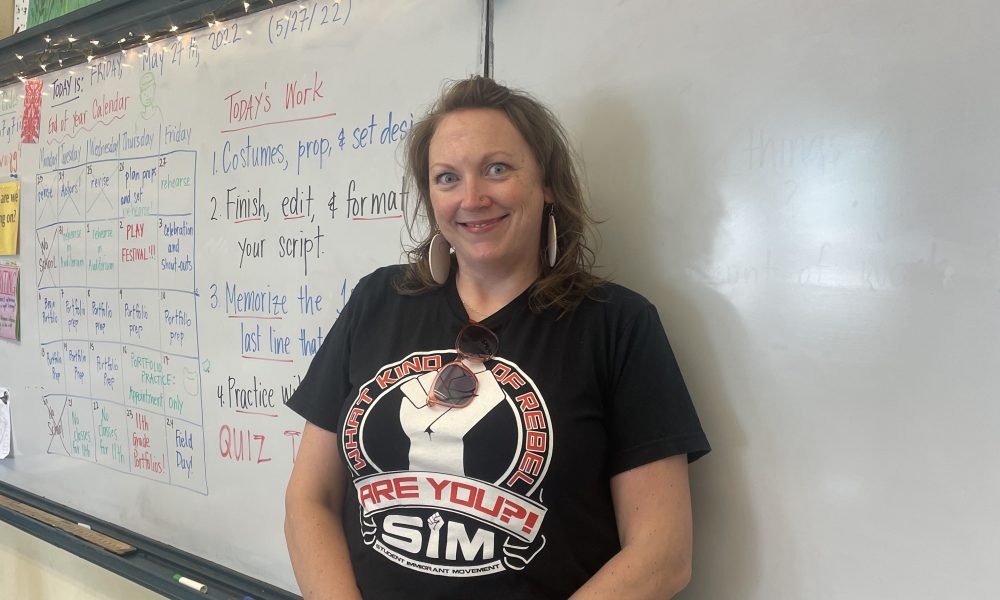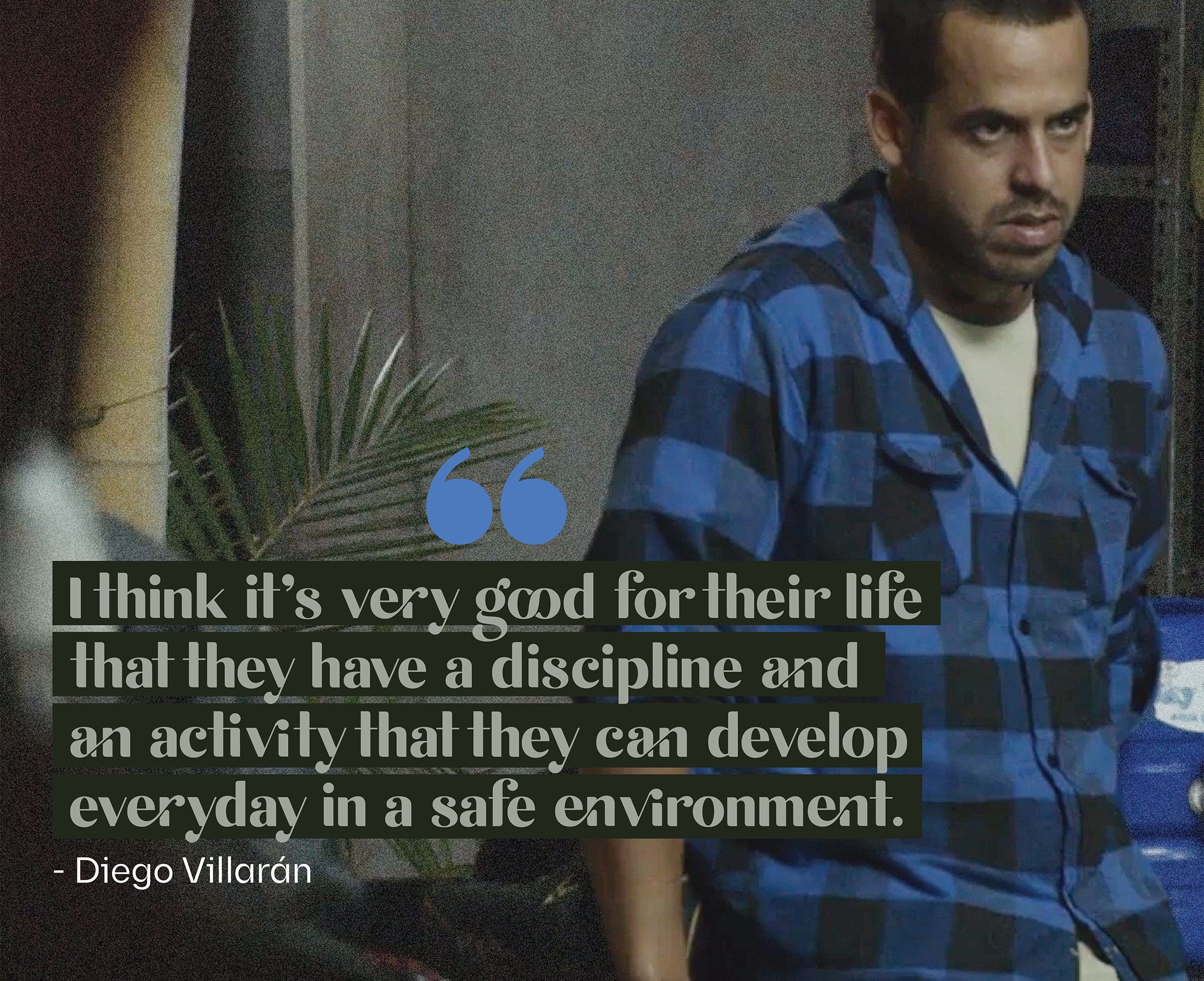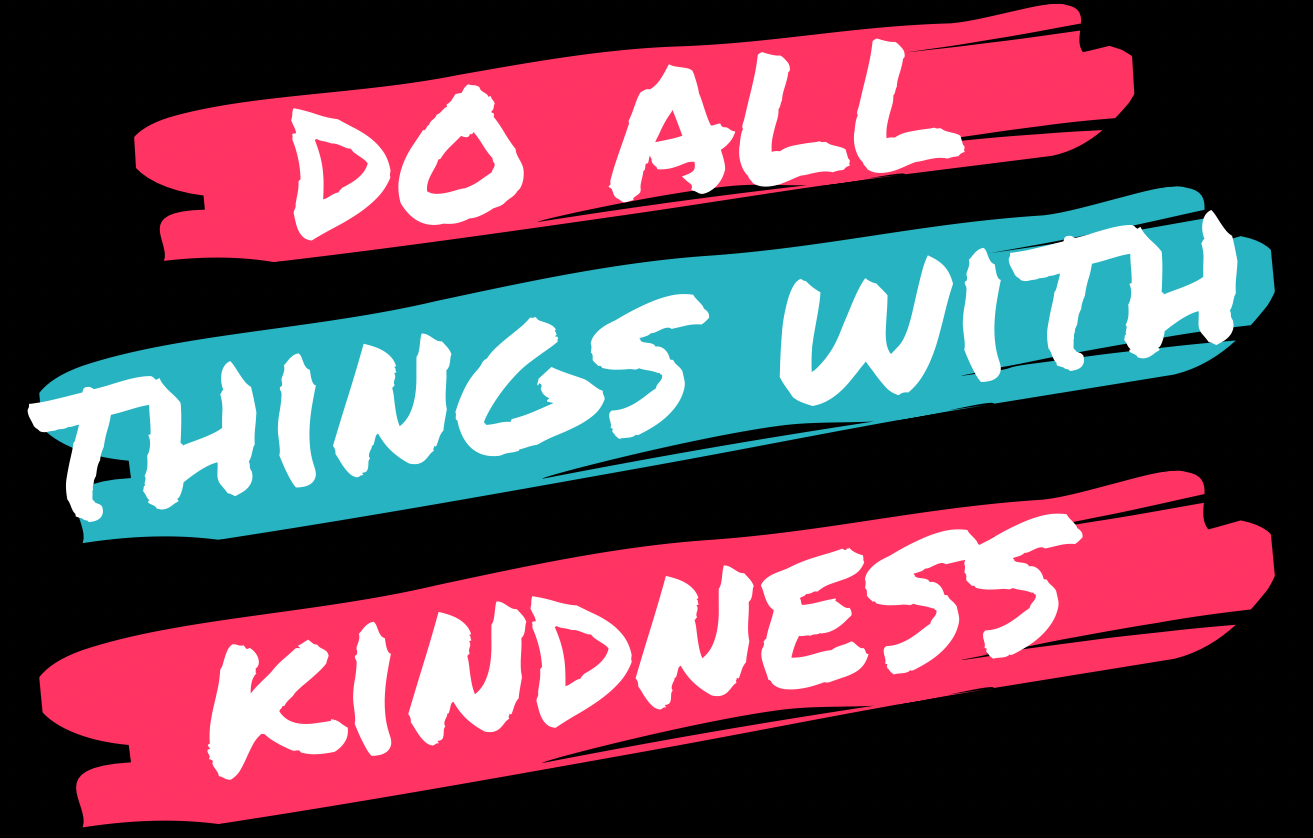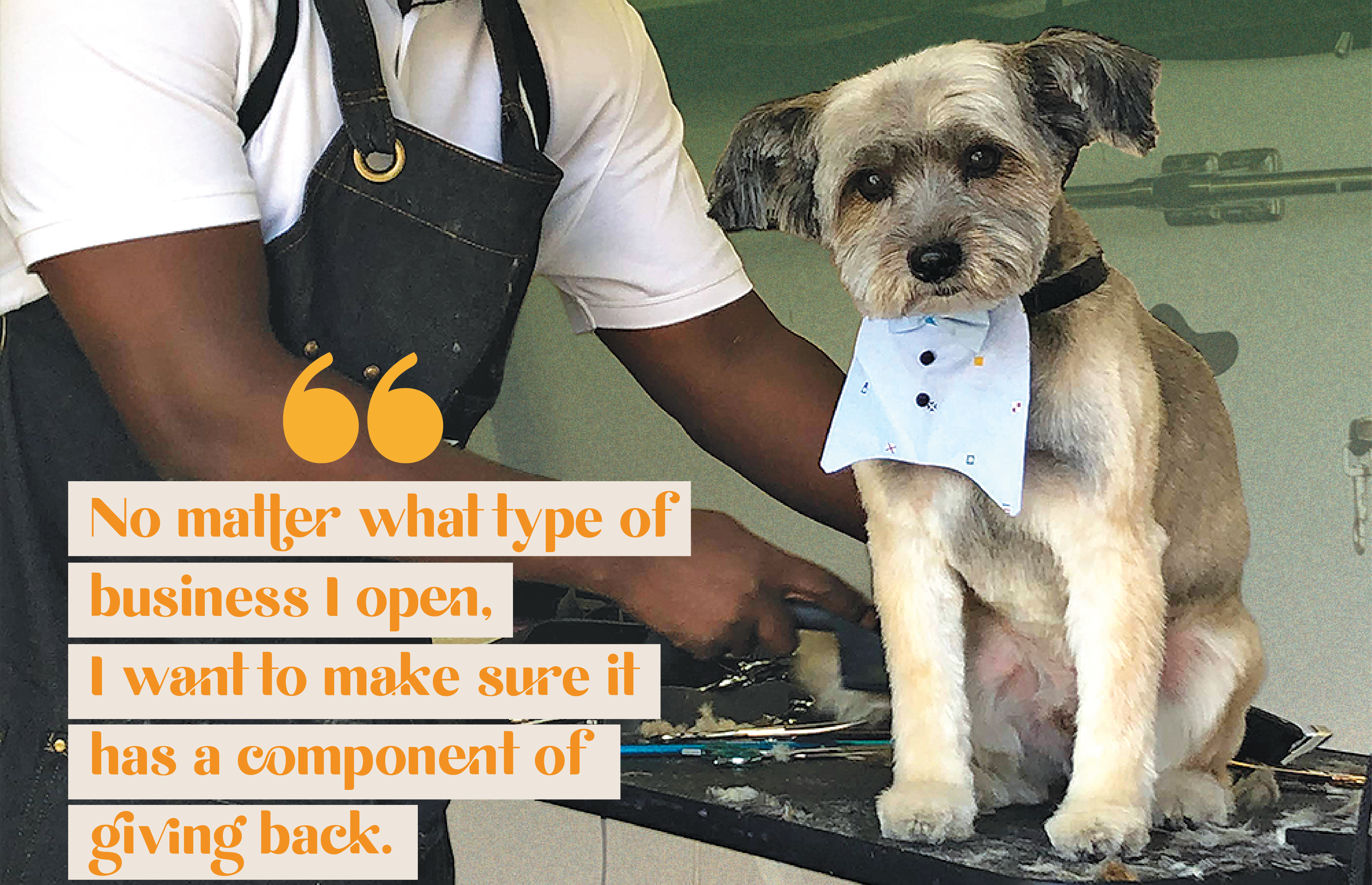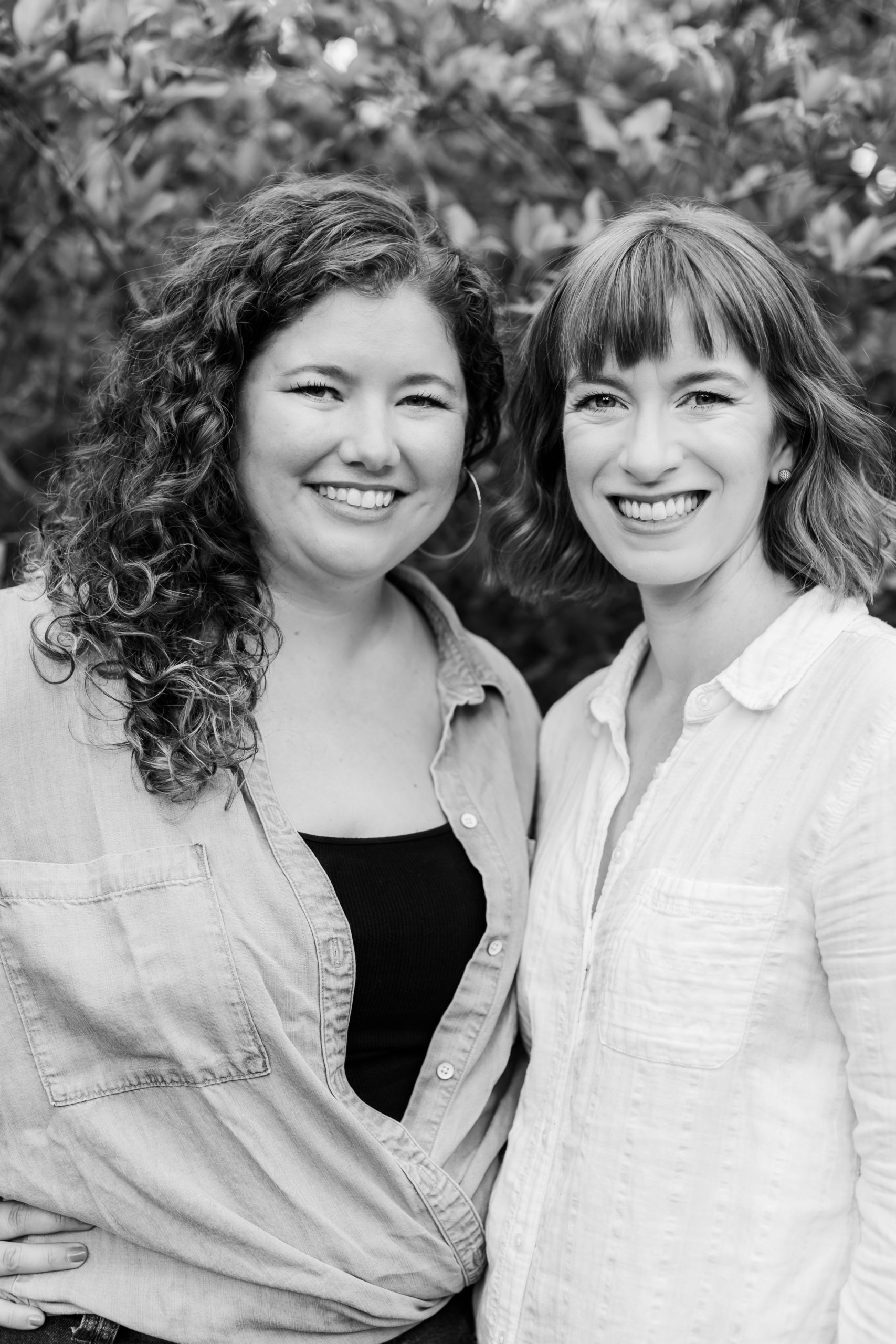Marisa: Hi! My name is Marisa and my pronouns are she/her/hers. I am a full-time student as well as a member of Born This Way Foundation’s 2023 Advisory Board. I am beyond thrilled to be joined by two of my fellow Advisory Board members, Vaishnavi and Nikoletta! Would you both like to introduce yourselves?
Vaishnavi: Namaste! My name is Vaishnavi, and I use the pronouns she/her/hers. I am a youth leader from India who works for creating an equitable mental health ecosystem, so I am eager to contribute and learn from my position as a member of the Born This Way Foundation’s 2023 Advisory Board.
Nikoletta: Hello! My name is Nikoletta and my pronouns are she/her/hers. I am studying psychology full time, and am grateful to be a member of the 2023 Born This Way Foundation Advisory board.
Marisa: I’m so excited to have a conversation with you both about mental health and the work you are passionate about. I wanted to first ask you both about your journey to becoming a mental health advocate. Why did you choose to start advocating for mental health, the well-being of others, kindness, and creating safe spaces for those in your community?
Vaishnavi: Mental health has always been close to me but when it became a personal concern to me as well, I realized how difficult it is to go through psychological and emotional turbulence every single day and how comprehension is more important than mere communication. I’ve always been concerned about the issue of mental health, but when it started to affect me personally, I saw how challenging it is to experience psychological and emotional upheaval every single day, and how understanding is more crucial than merely communicating. As days went by, I became more familiar with the challenges that are there in the mental health ecosystem of our society. At that point, I decided that working passionately on issues related to mental health would also be one of my priorities. You can’t just be complaining and being helpless, right?
Nikoletta: My personal experiences with facing mental health challenges paved the way for my journey into advocating for the mental health of others. Indeed, I realised quickly that in situations where I was feeling isolated, unsafe, or ashamed, that other people were likely feeling similarly. This understanding helped strengthen my capacity to empathise more easily with other people who were struggling and inspired me to start advocating for others who might be experiencing challenges of their own. Four years ago, my passion for creating safe spaces and supporting others led me to enroll in a psychology degree at university, and I am now on my way to becoming a clinical psychologist.
![]()
Vaishnavi: Marisa, this is similar to a question I had for you. When was the moment you decided that mental health is something that you want to openly work on, and not regard it as merely a personal concern?
Marisa: Around the start of the pandemic, I began to see how the sudden shift of the way of life we were experiencing was affecting the mental health of me and people I knew. But, I was also inspired by how openly I saw people talk about their own mental health struggles. It became very evident to me how important and necessary it is to work to end the stigma surrounding mental health.
![]()
Nikoletta: Lived experience of living with/or overcoming mental health challenges helps us to empathise and understand the experiences of others who might be feeling similar to us. How have your own mental health-related experiences positively impacted your advocacy?
Marisa: At the start of the pandemic, I struggled a bit with adjusting to a new normal, and oftentimes I just wanted someone to listen. I realized the importance of being there to listen to others, judgment-free. This has impacted my advocacy in the way that I want others to know that sometimes what is seemingly a small gesture such as that can go miles and make all the difference for someone.
Vaishnavi: My personal experience with bad brain health has significantly impacted my advocacy work because it brought a lot of challenges in the mental health ecosystem closer to me. It has helped me in developing an accurate understanding of what are the needs and challenges in the area, and also greater sensitivity to the issue.
![]()
Nikoletta: Thank you both for sharing! Stigma can make it difficult to reach out for help. Why do you think normalising discussions about mental health is important?
Vaishnavi: I would like to answer the question in the context of Indian society. Here, we have been associating any sort of mental illness with insanity and, in extreme cases, associated with some paranormal activity for ages. The situation has not improved much even today. People have stopped believing that psychological disorders can happen to anyone like any other disease that is more acceptable like fever, flu etc. Although there have been conversations about mental health, they are still insufficient given the severity of the problem in our culture. I still cannot share it with everyone and make them understand. So, there is a need for more efforts to normalise it.
Marisa: I think that there is power in being vulnerable. It allows us to connect with one another in ways that we might have not thought to be possible and most importantly, lets us know that we aren’t alone in a way that we’re feeling. Normalizing discussions about mental health will truly help so many people.
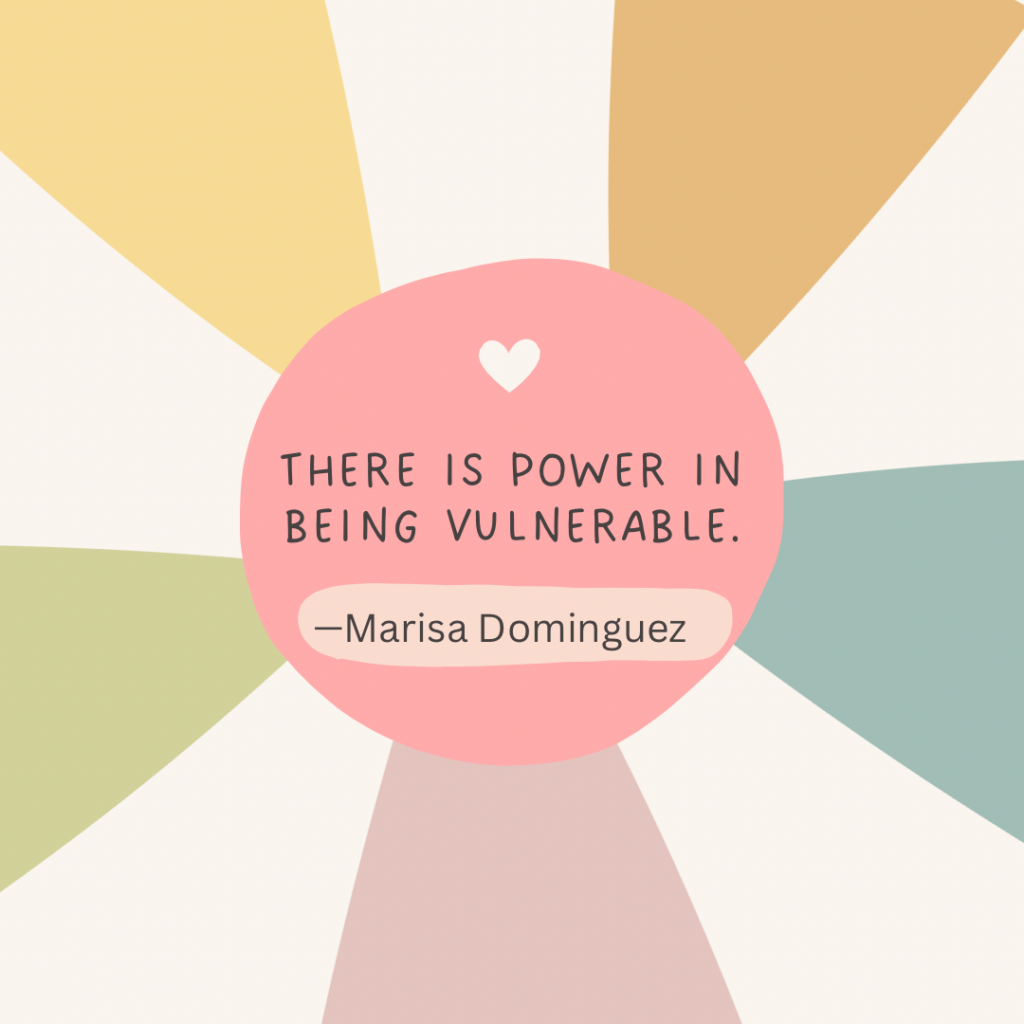
Nikoletta: Adults/caregivers can also find it difficult to connect with young people due to generational differences. What advice do you have for teachers/ parents/ caregivers about what they can do or say to better support the needs of young people?
Marisa: A simple “How are you?” or “How have you been this week?” could truly go far. Sometimes we just want to be listened to and know that we are supported, so being willing to listen and allowing us to talk openly is one way as well.
Vaishnavi: Honestly, it’s a difficult question because you cannot expect people to keep aside their misconceptions and preconceived notions especially when it’s in the context of inter-generational differences. But I would say that, in the cases where you are there to support someone emotionally, it’s more important to be a better and good listener because it helps you understand different realities other than your experiences.
![]()
Marisa: Self-care also plays an important part in maintaining your mental health. What ways do you practice self-care?
Vaishnavi: For me, self-care should be about the things that I do which has nothing to do with enhancing my career. If it’s self-care, then it has to be far from something productive. Although I am still learning things about myself and what can actually help in supporting my mental health, activities like taking care of my skin, having my favourite food without a second thought, writing poetry in Hindi and Urdu, and watching the content of my BTS do give me comfort and joy.
Nikoletta: Self-care for me involves listening to my body and what it needs moment to moment. This can sometimes be hard to do! In order to rest and recharge, I enjoy doing calm and quiet activities such as knitting and crocheting; these are some creative outlets that bring me joy. Self-care for me is also napping! Sometimes when my energy is low, having a short afternoon nap can give me an extra boost of energy. I also prioritise getting out in nature; short walks or reading a book under the trees helps me to feel regulated and calm.

Vaishnavi: On a personal front, Marisa, how do you take care of your mental and emotional health?
Marisa: On the topic of practicing self-care, it is also the way I take care of my mental health, with one of the main ways being doing activities that I love. I love spending time with family and friends, listening to music, going to concerts, and finding new movies and TV shows to watch.
![]()
Vaishnavi: Nikoletta, I had a similar question for you. It’s natural to witness the lows in life, so how do you manage those days?
Nikoletta: When I’m having a rough day, I try my best to let it out and have a good cry. I’m grateful to have friends who I can reach out to for support, and they always help me to feel seen. When I’m down, a laugh always makes me feel better! Whether it’s through watching a hilarious video that my friend has sent me or finding one funny thing to laugh about even in the midst of a terrible situation, finding a way to laugh always helps me get through.
![]()
Nikoletta: You both mentioned using forms of media and art as a way you practice self-care. Storytelling in all forms is courageous and can inspire others to be brave. What are some books, songs, or other forms of art that inspire you?
Vaishnavi: That’s a tough one because I can be inspired by any form of art if it is conveying something that is related to my life. But the most favourite ones are the songs written in Urdu, especially the songs from the Pakistani series, and Bollywood songs from the early 2000s and 90s. They always convey to you the deepest thoughts in a poetic way, which have beautiful lyrics and artful compositions.I will mention one of my favourite lines from a song called In Dino. “In dino dil mera, Mujhse hai keh raha, Tu.. khwaab saja, Tu.. jee le zara, Hai tujhe bhi ijaazat, Kar le tu bhi mohabbat.” In English- “These days my heart is telling me, You dream, you live a little, you are also allowed, you also fall in love.”
Marisa: For me, music constantly inspires me. One of my favorite artists is Taylor Swift and I’ve been inspired by her music since I was in elementary school. One of my favorite lyrics of hers is, “You gotta step into the daylight and let it go” from her song “Daylight,” which is about your past pain and mistakes not having to define you. I go back to this lyric when I need to remind myself that it’s okay to let something in my past go and that it’s okay to move on. I’m also a huge fan of Lady Gaga, of course! “Chromatica” is one of my all-time favorite albums and I’ll never forget listening to it for the first time. I was dealing with so much sadness personally at the time, as was the whole world, and it was released at a time when I didn’t know how much I needed to hear it. It reminded me how powerful music truly is as a medium of storytelling, as it can bring healing and allow listeners to feel like they aren’t alone. I’m inspired by Lady Gaga’s vulnerability on the album because it’s an incredibly brave act, especially when everyone is going to hear it. For that, I’ll forever be inspired and equally as grateful for “Chromatica.”
![]()
Vaishnavi: I had some questions for the both of you in regard to the work you both do. Marisa, you have mentioned before that you want to ensure equality in the STEM field, can you tell us some challenges in the context of equality and fairness that are there in the field and if they are also affecting the mental health of concerned students?
Marisa: Some of the main challenges are the stereotypes surrounding the STEM field, a lack of access to STEM-related education, and there not being as many role models for underrepresented groups in the field to look up to. A lot of the time, STEM is seen as more of a masculine field, and it’s hard to picture yourself in a field or a place where you don’t see yourself represented. According to the American Association of University Women (AAUW), parents and teachers can underestimate girls’ abilities in mathematics as early as preschool, which can play a role in limiting access and preparation to then enter STEM fields as an adult. From personal experience, it’s really difficult and saddening to hear and see people say that women in the industry aren’t as talented as the men are. It’s also mentally and emotionally draining to feel like you have to constantly prove yourself to others around you.
![]()
Vaishnavi: Have you thought of any ideas that can help you in exploring the possibility of an intersection between the tech industry and mental health?
Marisa: I feel like starting a conversation would be a good first step. I would love to sit down and talk with a group of students and professionals in the tech industry and ask them about their mental health experiences as a student studying to join the industry and/or a professional who is already in it. I would like to know what they think school departments, employers, and the industry as a whole can and should do to ensure the mental well-being of both students and professionals.
![]()
Vaishnavi: Thank you for sharing, Marisa. Nikoletta, I am quite interested to know about one project that has inspired you to work more for the community.
Nikoletta: Being part of the Bravehearts Youth Advisory Council has inspired me to work more in the child protection area. Bravehearts is an Australian child protection organisation dedicated to the coordinated and holistic prevention and treatment of child sexual abuse. Through being part of this team, and having the opportunity to engage with wise and caring young people, I have learned a lot about the power of youth perspectives in initiating positive and effective changes across different communities.
Vaishnavi: How do you plan to use your knowledge and experience at BTWF?
Nikoletta: I’m excited to use what I have learned through my experiences in mental health and youth advocacy, peer support, mental health research, and service design to Born This Way Foundation. Through sharing what I have learned about and witnessed, I hope to bring unique ideas to the Foundation and explore how my experiences advocating for mental health in Australia can positively impact BTWF.
![]()
Marisa: I wanted to ask you both about the importance of kindness to you. Kindness goes hand-in-hand with mental health. Why do you think advocacy for kindness is important? What does it mean to you?
Nikoletta: Kindness lets people know that they are not alone, that somebody cares about them, and is looking out for them. Kindness includes being considerate of others, their feelings, and their differences, and celebrating them for who they are. It is also imperative that we are kind to ourselves. We are all trying our best, and through being there for each other, and being kind to ourselves, we can make positive changes.
Vaishnavi: There is a strong and undeniable need for kindness not only for others but also for ourselves in the modern world, which faces some unprecedented challenges. Therefore, I firmly believe that if you try to act with kindness and compassion while interacting with others and with yourself, you can enable many individuals to be open about their silent challenges, which are tragically claiming many lives. All of us have kindness by nature; we just need to dig deeper to rediscover it. I want people to realise that kindness is important because we all need each other. People are struggling and they are struggling badly. The least we can do is be kind! Let’s focus more on the idea that “I am because you are” and see how kindness will eventually bring us comfort and joy in life.
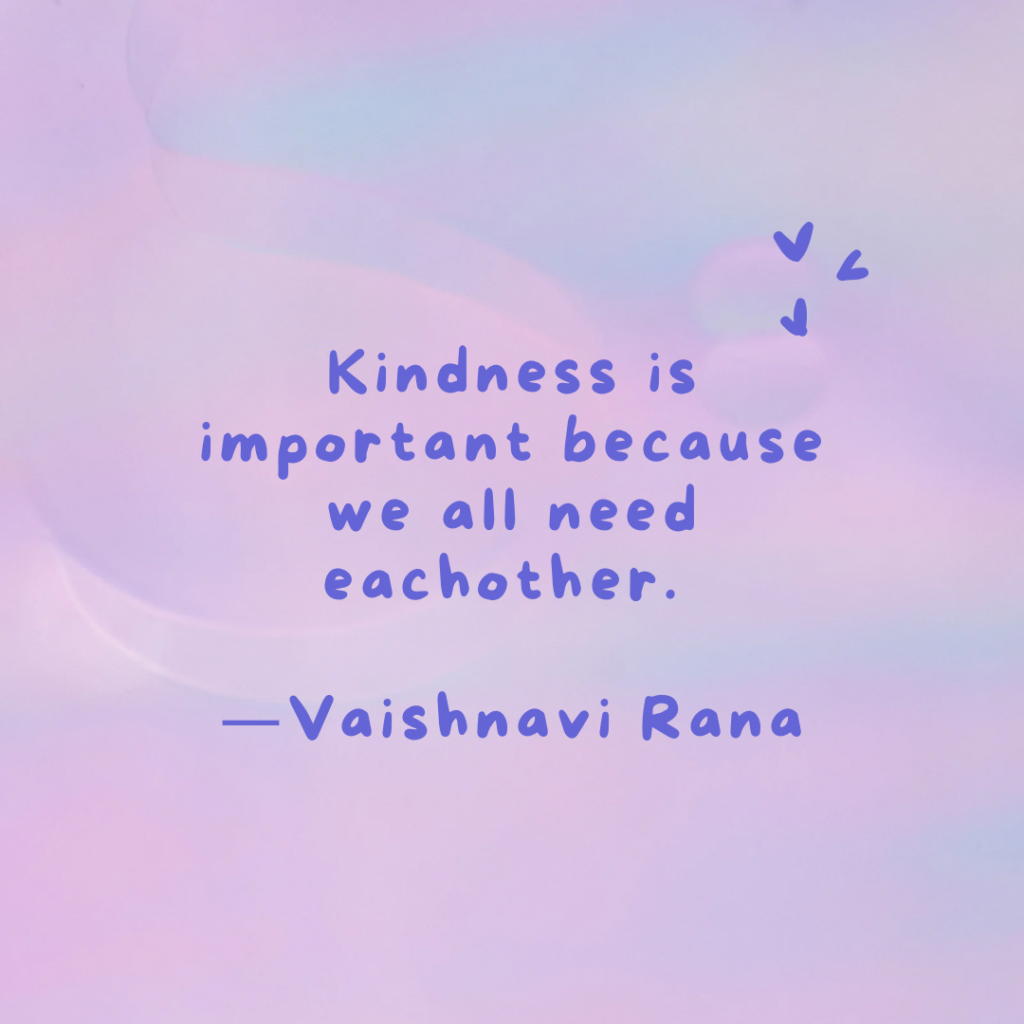
Nikoletta: On the topic of kindness, a small act of kindness can make an incredible difference in somebody’s life. What is one kind thing that somebody has done for you that has stayed with you/ that you still remember?
Vaishnavi: During the pandemic when I was suffering badly because of psychological issues and emotional turbulence, one of my closest friends sent me a handwritten letter by courier. In the world of technology, this old-age way of expressing love gave me so much comfort and joy. It was a beautiful letter! If you are listening Anamika, Thank you so much!
Marisa: A kind thing that somebody did for me that has stayed with me was when my mom surprised me by getting me a cake from a baker whose desserts she remembered I had been wanting to try. I graduated high school in 2020, so I was feeling a little sad from having to cancel my plans of having a graduation party. My mom bought me the cake and decorated the kitchen with graduation-related party supplies. I was so happy!
![]()
Marisa: I’ve loved getting to talk with the both of you! I have a couple more questions. What is something that you have accomplished on your journey as an advocate for mental health and wellness that you are proud of?
Vaishnavi: I believe I have grown in knowledge and comprehension of the appropriate language to employ while interacting with persons who are experiencing daily struggles. I am quite proud of this since it is necessary for someone who is an advocate for the mental health of others. The Be There Certificate, which gave me excellent insights into how to handle certain circumstances, deserves credit as well. And when my friends text me, “It feels good talking to you,” I am reminded of how significant these little life lessons are.
Nikoletta: I am always seeking out new training programs and opportunities to help me to become a better mental health advocate. One area that I have developed my skills in is being able to hold space for others, especially when they are going through a hard time. I think that it is an important skill to be able to be a non-judgemental, kind listener to people; often, people feel shame when opening up vulnerably about their feelings, and learning about ways to be a better listener is something that I am proud of, and strive to keep improving in.
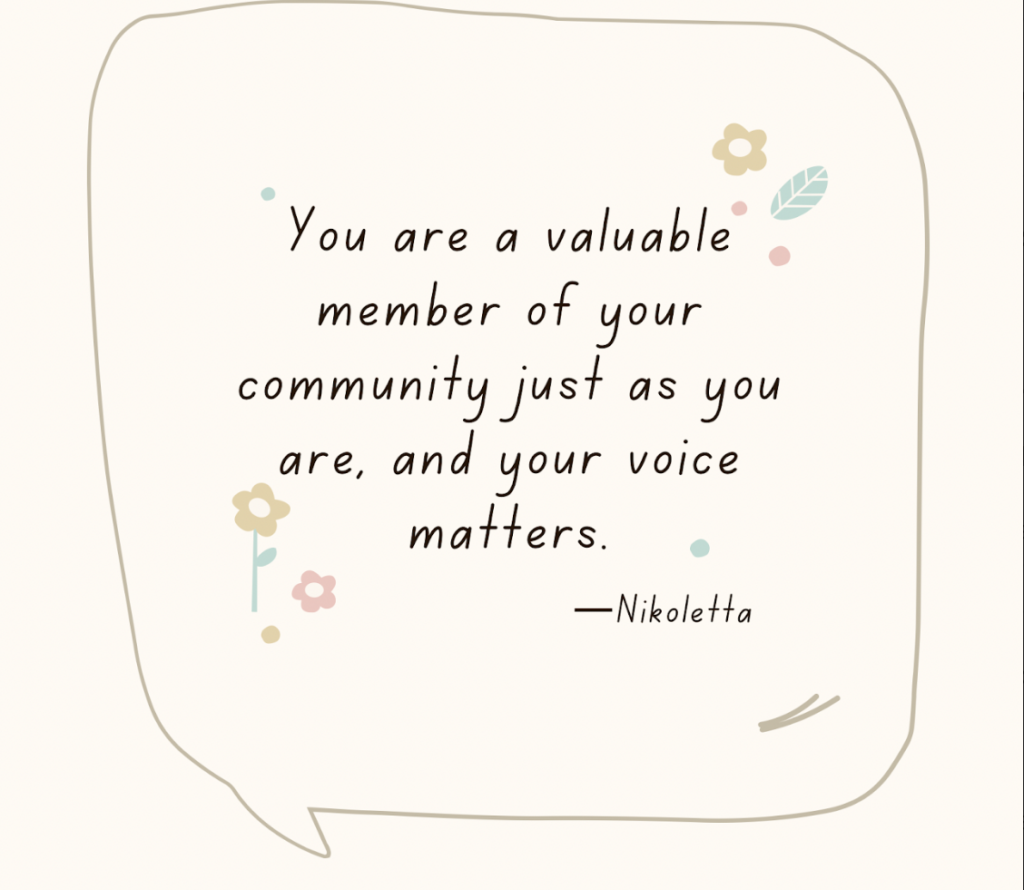
Marisa: You both have accomplished so much! Thank you for the work you do. The last question I had for you is what would you say to someone who wants to help their community in a way that you have?
Vaishnavi: I would say,- thank you so much for trying to bring joy and hope to others’ lives. Not everyone is doing it and if you are doing it, I am proud of you. You don’t need to know everything about what you are working on unless you are always curious to learn more. It’s going to be a tough route, but even in those moments, please never lose hope in the goodness and happiness that your actions are going to bring. Love you and all the best!
Nikoletta: What an exciting venture you’re going on! Think about the things you are passionate about and research ways that you can get involved. One great place to get more information about your local community and the initiatives that are taking place is your local library. As they say, ‘No act of kindness, no matter how small, is ever wasted;’ it’s the smaller, person-to-person positive changes that lay the groundwork for larger, systemic changes. You have got your own unique skills, passions, and experiences that have a place in your community. You are a valuable member of your community just as you are, and your voice matters. Remember that!








